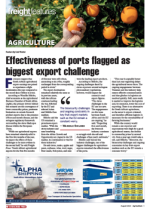The demand for temperature-controlled storage and logistics solutions for agricultural products has seen a consistent upward trend, according to Shatho Manyanda, general manager of Table Bay Cold Storage (TBCS).The company has recently introduced cutting-edge, automated warehousing systems, significantly elevating its capacity to deliver precise and streamlined storage and handling solutions catering to an extensive array of frozen and chilled agricultural products. Moreover, through cost optimisation initiatives, it can now offer f lexible and responsive services that meet clients’ budgets.“The agricultural volumes in South Africa have been f luctuating in recent years,” said Manyanda. “While specific trends may vary, we have observed a steady increase in the demand for temperature-controlled storage and logistics solutions. This can be attributed to increasing consumer demand for fresh produce, growing export opportunities, and the need to ensure optimal quality standards throughout the supply chain.”On a broader level, he said the agricultural sector faced many challenges, each inf luencing production volumes. From the implications of climate change on crop yields to the constraints of water scarcity, f luctuations in labour availability and associated expenses, as well as the intricacies of securing financing for small-scale farmers, the sector finds itself contending with a range of pressures. Furthermore, the industry has grappled with navigating intricate regulations and compliance protocols. The advent of the Covid-19 pandemic further compounded matters, introducing fresh hurdles like disruptions within supply chains and inefficiencies in logistical operations.He said as a facility specialising in cold storage and logistics, they faced their own set of hurdles, mainly revolving around maintaining the integrity of the cold chain, ensuring proper temperature control throughout the storage and transportation process, and minimising any potential quality loss or spoilage due to ongoing load-shedding. “Backup generators burn a lot of diesel, making it very challenging to offer affordable solutions to our clients. At the same time, these challenges create an opportunity for renewable energy, something we are exploring. We also invest in advanced technologies and rigorous quality control measures to address these challenges effectively,” he told Freight News.Asked about trends in the sector, Manyanda said there was an increasing demand for traceability and transparency in the supply chain. “Consumers are becoming more conscious of the origin and handling of food products. This creates a need for comprehensive tracking systems and certifications that assure the safety and quality of agricultural products from farm to table.”He said overall, his outlook for agriculture remained optimistic. “The sector has immense potential for growth and innovation. With technological advancements, increasing consumer awareness, and evolving market trends, opportunities exist to leverage sustainable farming practices, expand export markets, and improve supply chain efficiencies. Collaboration and partnerships will play a crucial role in driving the growth and resilience of the sector.”

